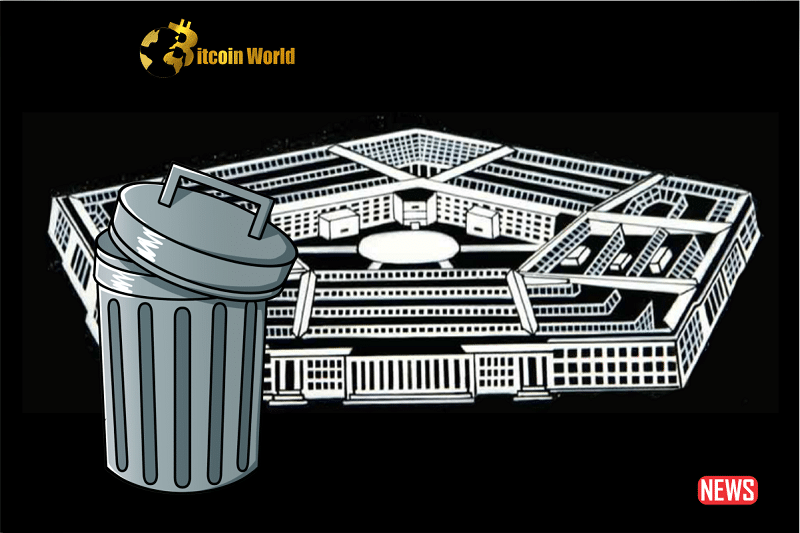Imagine paying over $50,000 for a simple trash can. Sounds absurd, right? Well, a recent report from an American think tank reveals that the U.S. Department of Defense (DOD) reportedly did just that, shelling out a staggering $51,600 to Boeing for a trash receptacle that originally cost a mere $300. How did this happen? Let’s dive into this eye-opening situation that’s sparking serious concerns about corporate price gouging within the defense industry.
How Does a $300 Trash Can Become a $51,600 Expense?
The story unfolds with a seemingly simple change in designation. This particular trash receptacle was used in the E-3 Sentry surveillance plane, which is based on the civilian Boeing 707 airliner. When the 707 fell out of widespread commercial use, this container lost its “commercial item” status. This seemingly bureaucratic shift allowed Boeing to dramatically inflate the price. According to Responsible Statecraft, the online magazine for the Quincy Institute, the Pentagon paid over 170 times the original price. Think about that for a moment – the cost of a small car for something you throw your garbage into.
| Item | Original Price | Price Paid by DOD | Markup |
|---|---|---|---|
| Trash Receptacle | $300 | $51,600 | Over 17,000% |
Is This an Isolated Incident?
Unfortunately, this isn’t the only instance raising eyebrows. A recent CBS News investigation uncovered similar concerns with Raytheon Technologies. The investigation revealed that the cost of their stinger missiles had skyrocketed from $25,000 to over $400,000 per unit. These cases paint a worrying picture of potential systemic issues within defense contracting.
What’s Being Done About It? Congressional Scrutiny
The exorbitant cost of the trash receptacle and the rising missile prices haven’t gone unnoticed. A bipartisan group of senators, spearheaded by Bernie Sanders, has sent a letter to Defense Secretary Lloyd Austin. Their demand? An update on the DOD’s strategies to combat corporate price gouging. These senators are rightly concerned about the lack of accountability for the vast sums of taxpayer money flowing to highly profitable private corporations.

Why Should We Care? The Growing National Debt
These revelations come at a critical time. The total U.S. national debt has surpassed a staggering $32 trillion, with hundreds of billions being added in just short periods. When we see instances like the $51,600 trash can, it begs the question: Are taxpayer dollars being used responsibly? Excessive and unchecked defense spending, coupled with potential price gouging, significantly contributes to the national debt and raises ethical concerns about how public funds are allocated.
Key Concerns Regarding Defense Spending:
- Lack of Transparency: How can taxpayers be sure they’re getting value for money if pricing isn’t transparent?
- Impact on National Debt: Every inflated price contributes to the growing national debt burden.
- Ethical Implications: Is it ethical for corporations to drastically inflate prices on essential items for national defense?
- Opportunity Cost: Could these funds be better allocated to other crucial areas like education, healthcare, or infrastructure?
What Can Be Done? Actionable Insights
Addressing this issue requires a multi-pronged approach:
- Enhanced Oversight: The DOD needs stronger oversight mechanisms to scrutinize pricing and prevent excessive markups.
- Independent Audits: Regular, independent audits of defense contracts can help identify and address potential price gouging.
- Negotiation Strategies: The government needs to employ more robust negotiation strategies when dealing with defense contractors.
- Promoting Competition: Fostering greater competition among defense contractors can help drive down prices.
- Legislative Action: Continued pressure from lawmakers is crucial to holding the DOD and defense contractors accountable.
The Bottom Line: Ensuring Responsible Spending
The case of the $51,600 trash can serves as a stark reminder of the potential for abuse within the defense industry. The investigations into inflated missile costs further underscore the urgency of the situation. As the national debt continues its upward trajectory, ensuring responsible and transparent spending practices is paramount. Taxpayers deserve to know that their money is being used effectively and ethically to support national security, not to line the pockets of corporations through exorbitant pricing. The demand for transparency and accountability from bipartisan senators is a positive step, but continued vigilance and action are needed to protect taxpayer interests and ensure a more responsible approach to defense spending. This isn’t just about a trash can; it’s about the broader issue of fiscal responsibility and the ethical use of public funds.
Disclaimer: The information provided is not trading advice, Bitcoinworld.co.in holds no liability for any investments made based on the information provided on this page. We strongly recommend independent research and/or consultation with a qualified professional before making any investment decisions.


